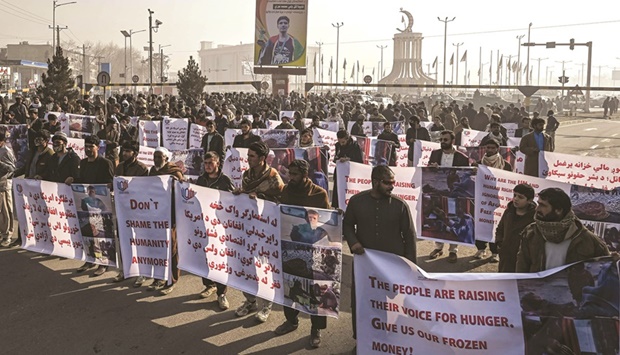The United States has submitted a new draft resolution to the UN Security Council on facilitating humanitarian aid to Afghanistan while keeping it out of Taliban hands, after abandoning an earlier proposal under pressure from China.
After a first draft was rejected by US rivals China and Russia, but also India, France and Britain, Washington submitted a new version seen by AFP to the 15-member council, which could vote on the resolution soon, according to diplomatic sources.
Veto-wielding Beijing’s objections were not immediately clear.
The new draft says “that for a period of one year, humanitarian assistance and other activities that support basic human needs in Afghanistan are not a violation of” the 2015 resolution 2255 that imposed sanctions on Taliban-related entities.
“The processing and payment of funds, other financial assets or economic resources, and the provision of goods and services necessary to ensure the timely delivery of such assistance or to support such activities are permitted,” the draft reads.
The international community has struggled over how to avert a humanitarian catastrophe amid economic meltdown in Afghanistan since the Taliban swept back to power in mid-August, prompting the United States to freeze $9.5bn in assets belonging to the Afghan central bank.
The text “strongly encourages providers” of humanitarian assistance “to minimise the accrual of any benefits” – whether directly or indirectly – by sanctioned individuals or entities.
Earlier in the day, China, supported by fellow permanent Security Council member Russia, had blocked an initial US plan to authorise case-by-case exemptions to sanctions for humanitarian purposes.
“Humanitarian aid and life-saving assistance must be able to reach the Afghan people without any hindrance,” China’s UN ambassador, Zhang Jun, said in a tweet on Monday. “Artificially created conditions or restrictions are not acceptable.”
The new US draft deletes an entire paragraph relating to a case-by-case exemption mechanism in response to Beijing’s criticism.
The decision to limit the scope of the resolution to one year, which was not part of the first draft, aims to satisfy Washington’s European allies, who, like India, had criticised the absence of any deadline and called for strict control over the destination of aid – another added element.
There was no immediate comment from the US mission to the UN.
Such a resolution should allow humanitarian workers who “need to work with and have financial transactions with ministries run by” sanctioned individuals to avoid violations, a diplomat told AFP on condition of anonymity.
After the Taliban takeover, the International Monetary Fund (IMF) and the World Bank also suspended activities in Afghanistan, withholding aid as well as $340mn in new reserves issued by the IMF in August.
On December 10, the World Bank said international donors agreed to release $280mn to Unicef and the World Food Programme for Afghanistan.
However, a UN official, speaking on condition of anonymity, said that much more was needed.
“We need a lot more of the funding that’s been frozen at the bank released and we need donors to contribute,” he said.
UN undersecretary for humanitarian affairs, Martin Griffiths, emphasised the urgent “need for liquidity and stabilisation of the banking system” on Sunday at a ministerial meeting in neighbouring Pakistan, “not only to save the lives of the Afghan people but also to enable humanitarian organisations to respond”.
Meanwhile, around 200 Afghans marched in Kabul yesterday to demand the release of billions of dollars of assets frozen by the international community – a rare protest allowed by the Taliban as the country battles a major economic crisis.
There were no women in Tuesday’s march, organised by a little-known group called the Afghan People’s Movement, which in the past has held peace rallies in the capital.
The Taliban have outlawed protests unless approved, cracking down hard on several demonstrations held by women clamouring for the right to jobs and education.
Yesterday’s march clearly had the blessing of Afghanistan’s new rulers, with Taliban social media accounts featuring multiple images and video clips saying that participants spoke for ordinary citizens.
“Let us eat” read one banner carried by a marcher near a square in central Kabul.
“Our main demand is that the United States should release our assets as soon as possible,” organiser Shafiq Ahmad Rahimi told AFP. “This is the wealth of the nation, not of any single person, group or government.”
Since the Taliban’s August 15 return to power, nearly $10bn of assets have been frozen by an international community loathe to give access to the funds directly to the hardline Islamists.
However, the country is in the grip of a major humanitarian crisis and the United Nations says more than half of Afghanistan’s 38mn people face hunger this winter.
Western countries have tied the unfreezing of assets to the Taliban respecting human rights – especially with regard to women being allowed to work and girls to attend school.

People hold banners before marching on the street during a protest in Kabul.
